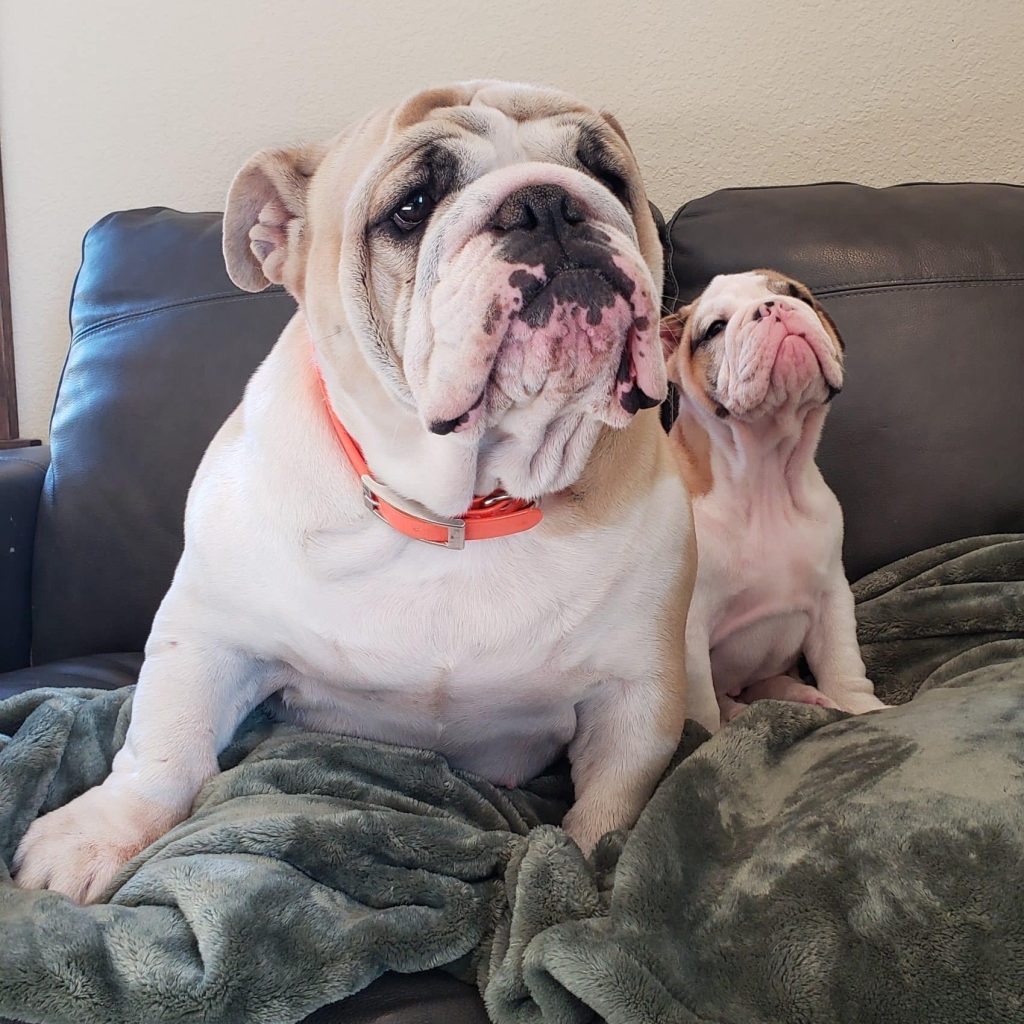Should My Bulldog Go to Obedience Class?


Should My Bulldog Go To Obedience Class?

If you’ve been considering whether or not your bulldog should go to obedience school, you’ve landed on the right page. You may have mixed feelings when you hear the word “obedience.” However, we want to help provide you with the most well-informed guidance on what, when, why, where, and the pros and cons of taking your bulldog to obedience school.
What Is Obedience Classes?
The American Kennel Club defines obedience classes as helping dogs with “social behavior with both people and animals; helps correct annoying behaviors like jumping, digging, barking, and chewing; and keeps your dog entertained and happy.”
To put it frankly, obedience class is a must for English bulldogs. A dog who has been through an obedience class is a very well-behaved family dog who can navigate the social landscapes of living with people. A dog that hasn’t been to obedience class can cause problems in its new home.

New Litter Updates
Be the first to know about new litters and puppy pictures.
When Should My Bulldog Go To Obedience Class?
Ideally, English bulldog puppies (Canis lupus familiaris) should start obedience classes as soon as they have all their vaccinations or anytime there are behavioral red flags such as
aggressiveness or uncontrolled behavior. All of our puppies get vaccinated while they are with us. They should continue their vaccinations at home with their new family, and finish when they are fifteen weeks old.
The most crucial mistake many adopters make is waiting too long to correct a behavioral issue, and allowing it to linger. From our experience, adopters who can identify a behavioral issue quickly and access effective behavioral training within a few weeks will be much more successful in correcting bulldog misbehavior.

Often, improper behavioral denial will lead an adopter to delay or reject the idea that their
bulldog could ever need training. The most difficult bulldog to train is one that has been allowed to misbehave for years. Sadly, many bulldogs that do not get the training they need within the proper time frame never fully modify their behavior even after extensive training. Timing is key!
We recommend setting up obedience classes ahead of time so that you can get started as soon as possible. This prevents you from being put in a situation where your bulldog needs training immediately but no classes have any available slots.
Why Operant Conditioning Works for Bulldogs
When researching how to train dogs you will find so many opinions out there. Two of the most common are operant conditioning and alpha dog training. Let us be clear, alpha dog training is not something we recommend. This training often relies on a heavy hand that can almost be labeled as abusive, which we have found to be extremely ineffective.
Operant conditioning is a well-blended mix of positive reinforcement, and knowing when to implement negative reinforcement. This behavior can be controlled by the consequences that happen. According to Simply Psychology, “Behavior that is reinforced (rewarded) will likely be repeated, and behavior that is punished will occur less frequently.”

There has to be balance in bulldog training, otherwise things go awry. Too much positive
reinforcement lets the bulldog know they can act however they want. And an owner who is always firm and wants power over them teaches the dog to fear humans. Let’s view the two below examples of these types of reinforcements.
Positive reinforcement: your bulldog puppy goes potty outside, and you give them a treat.
Negative reinforcement: your bulldog puppy jumps on a stranger, and you give them a stern verbal warning not to do that.
We believe operant conditioning is the most balanced approach to training a bulldog because the very nature of a bulldog is sometimes a bit stubborn. We see many adopters struggle when they are not able to mix both gentle encouragement with stern correction.
Balance is key and your bulldog will be better off for it. A bulldog will happily ignore their owner’s positive direction and will learn to behave as they please if a mix of non-physical negative correction is not administered from time to time.
The most common bulldog behavioral issues often stem from owners unwilling to use enough verbal negative reinforcement within their training methods. Bulldog training is a lasting commitment that starts and ends with the owner.
Where Should I Take My Bulldog To Obedience School?
Where you take your bulldog for obedience classes will depend on where you live, what classes you can afford, and how extensive you want their training to be. If you have friends with bulldogs, they can be a great source of recommendations and help. If not, it’s easy to find reviews and suggestions online by searching your local area.
Remember, the most important thing is that they take an obedience class. If you can’t afford the best obedience class, that’s okay. If they take a class, it doesn’t have to be the most prestigious one. It’s also vital to remember that training your dog is a lifelong commitment. It doesn’t just end once the obedience classes are over.

Pros and Cons of Taking My Dog to Obedience Classes
Like everything in life, weighing the pros and cons of a decision you need to make is necessary. The positive effects of having your bulldog complete obedience classes are that they are well-trained, able to be around people, safe for the owner and the bulldog, and a healthy relationship between the pet and the owner.
Although there are not many cons of having your bulldog complete obedience classes there are some. Obedience school can be very expensive and there are various incorrect and ineffective training beliefs out there.
Over the years, we have seen countless well-intentioned bulldog owners who have poured
thousands of dollars into unproductive training methods. Methods such as using only positive reinforcement. Although positive reinforcement behavior training is effective on many dog breeds, we have found bulldogs need a mix of both positive and negative reinforcement to correct behavior. This type of balanced training is why we recommend operant conditioning training, which reinforces both situational positive and negative behavior when it’s needed.
The English bulldog is perhaps one of the best family dogs that are out there. And part of what goes into making sure they become that great family dog is ensuring they are taken to obedience school so that they can be well-trained.
Check Out our Available Puppies Here

Bruiser Bulldog’s Reviews








